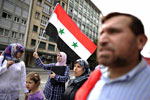 AFP: The world’s emerging powers on Thursday said dialogue was the only answer to crises in Syria and Iran at a summit aimed at bolstering their non-Western alliance’s influence on global affairs.
AFP: The world’s emerging powers on Thursday said dialogue was the only answer to crises in Syria and Iran at a summit aimed at bolstering their non-Western alliance’s influence on global affairs.
By Adam Plowright
 NEW DELHI (AFP) — The world’s emerging powers on Thursday said dialogue was the only answer to crises in Syria and Iran at a summit aimed at bolstering their non-Western alliance’s influence on global affairs.
NEW DELHI (AFP) — The world’s emerging powers on Thursday said dialogue was the only answer to crises in Syria and Iran at a summit aimed at bolstering their non-Western alliance’s influence on global affairs.
The BRICS bloc — comprising Brazil, Russia, India, China and South Africa — vowed to work together more closely on areas of mutual concern and launched plans for their first joint institution, a development bank.
At their fourth summit together, they also issued a pre-emptive warning against any military action by the West or Israel to end the unrest in Syria or the dispute over Iran’s nuclear programme.
“We agreed that a lasting solution in Syria and Iran can only be found through dialogue,” Indian Prime Minister Manmohan Singh said in a closing statement at the one-day summit in New Delhi.
A summit declaration warned of the “disastrous consequences” of allowing the Iran standoff to escalate into conflict and stressed that the bloodshed in Syria could only be resolved by “peaceful means”.
Much of the final statement at the conclusion of the one-day meeting dwelt on how the BRICS alliance would coordinate their positions together while lobbying collectively to grab a greater say in world affairs.
“In the future the BRICS agenda will be a step-by-step transformation of this forum into a strong and powerful organisation,” Russian President Dmitry Medvedev told reporters.
Though it remains in the planning stages, the newly proposed “BRICS Bank” is an attempt to cement the countries together. It is envisaged as a counterweight to other multilateral lenders such as the World Bank or the Asian Development Bank.
BRICS finance ministers will examine the “feasibility and viability” of the proposal and report back before the grouping’s next summit, in South Africa in 2013.
South African President Jacob Zuma said the bank would fund infrastructure and was an idea welcomed by other leaders on his continent. “Such a bank has great potential to help us create good jobs,” he said.
Two other agreements were signed aimed at simplifying credit facilities for exporters and increasing the use of each others’ currencies — and not the US dollar — in trade deals.
The leaders also pushed for the reform of international financial and economic institutions — a cornerstone of the BRICS agenda — but there was no common ground on who should become the new president of the World Bank.
The leaders said they “welcome the candidatures from the developing world” for the new head of the Washington-based body — to be announced by April — but they did not throw their weight behind either of them.
Colombian university professor Jose Antonio Ocampo and Nigerian finance minister Ngozi Okonjo-Iweala are attempting to break the US monopoly on the position.
This lack of unity, says critics, underlines the problems of the BRICS bloc, which brings together five geographically dispersed countries with different political systems, economies and priorities.
Walter Ladwig from the British think-tank the Royal United Services Institute wrote recently that they “have little in common” and will shape global governance in the future only as “individual nations.”
“BRICS countries have different national conditions and development models,” Chinese President Hu Jintao conceded. “We should see the differences as an opportunity to draw on each others’ strengths.”
Alongside the statements on the need for dialogue in Syria and Iran, the BRICS also voiced their support for a Syrian peace process promoted by international envoy Kofi Annan.
Russia and China — which both wield vetoes on the UN Security Council — have stridently opposed using force or outside intervention to resolve the Syrian crisis or defuse Iran’s nuclear drive.
The United States and its allies have been frustrated by a Sino-Russian veto in the Security Council on condemning Syria in stronger terms.
The lead-up to the BRICS gathering at a luxury hotel in the centre of the Indian capital saw demonstrations by hundreds of Tibetan exiles protesting against the presence of the Chinese president.
On Monday, a 27-year-old activist set himself alight during an anti-Beijing demonstration and died two days later.


